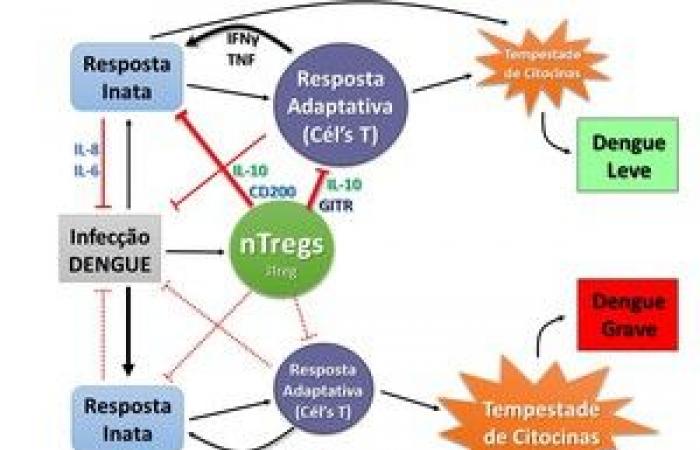Researchers from the Institute of Biological Sciences found immune system cells that mark the severe evolution of dengue. The so-called regulatory T (Treg), which inhibit the inflammatory process and prevent inflammation from getting out of control, present important dysfunctions and become inefficient in patients with severe conditions. A similar occurrence was identified by the same team in patients who died from Covid-19 and was described in an article published last year.
The study, whose results are about to be published, was carried out with 123 patients, including healthy volunteers who had never had dengue, patients with classic or mild dengue (treatment carried out at home) and patients with dengue with warning signs, severe or hemorrhagic. They were assessed during the febrile phase, 3 to 4 days after the onset of symptoms, and then after seven and 30 days since the onset of symptoms.
According to biomedical scientist Marcela Gonçalves, research into the mechanisms regulating the immune response in human dengue has been carried out since 2013, when the focus was on the natural defense system, called innate, and an overview of the cell populations of the system immunological.
Adaptive immune response
Next, the researchers focused on what they call the adaptive or acquired immune response, focusing on T cells. This occurs when the organism recognizes an agent that causes a certain disease and acts in a specific way to combat it. “I carried out a deeper and more detailed analysis of each of the cells and their functions”, explains the researcher, who is in post-doctoral residency at the ICB, under the supervision of doctor Helton Santiago, professor in the Department of Biochemistry and Immunology and clinical director of the Vaccine Technology Center (CTVaccines) at UFMG.
In the most recent investigations, researchers evaluated the production of several cytokines and identified that patients with mild dengue fever have regulatory T cells specific to the disease virus with the capacity to produce IL-10, an important factor in their function of controlling the disease. inflammation.
On their surface, these Tregs also express GITR and CD200, molecules that contribute to the reduction of inflammatory responses. The same cells are not present in patients with severe dengue. “In this work”, emphasizes Marcela Gonçalves, “we observed a population of functional Tregs specific to the dengue virus, present only in volunteers with mild dengue”. In the severe group, the researcher emphasizes, the population of these cells is not functional.
For Marcela Gonçalves, the mechanisms that prevent the activation of Tregs in severe dengue need to be better studied. “It seems that the induction of the regulatory response mediated by Tregs depends on several contexts, but all of them would lead to the impediment of functional activation of Tregs, most likely due to the strength of the initial inflammation”, assumes the researcher.
The research results suggest the need to investigate whether, in addition to antibodies, vaccines emerging to prevent dengue are inducing the presence of regulatory mechanisms mediated by Tregs to reduce inflammation. “We know that many people will not have immediate access to vaccines. It would be important, therefore, to develop drugs to stimulate the activity of regulatory T in the body in order to combat the hyperinflammation process that leads to the complication of dengue fever”, proposes the postdoctoral resident.
According to the researcher, a specialist in cellular immunology, there are already treatments based on a patient’s own regulatory Ts. “You take blood from the patient, isolate the cells, enrich it with the patient’s own regulatory T cells and then return the blood to them. This way, inflammation can be reduced. Although efficient, it is an individualized treatment and is therefore expensive “, counters Marcela Gonçalves.
Tags: UFMG Federal University Minas Gerais
--






